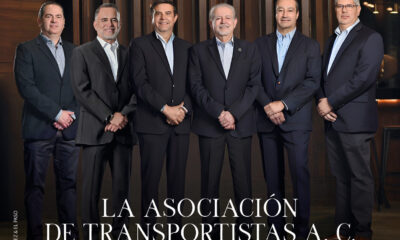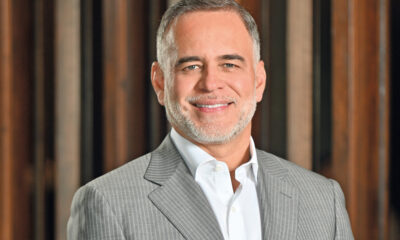Finanzas
La cuesta de otoño en las finanzas
Publicado
5 años antesel
Por
Staff
Por: Cambio de Cultura
Cosas que hacer durante tiempos difíciles
1. Un presupuesto
Hacer un presupuesto mensual te mostrará exactamente a dónde va tu dinero, sin especulaciones ni adivinanzas al respecto.
Si tus ingresos se han visto afectados últimamente, haz un presupuesto basado en la cantidad de dinero que tienes. Puede ser difícil cambiar tu estilo de vida, pero debes hacer sacrificios temporales para superar esto.
2. Ten cuidado de tus cuatro muros
Cuando las cosas se ponen difíciles, debes concentrarte en las cosas que realmente necesitas para sobrevivir. A estos los llamamos los cuatro muros. Los cuatro muros son tu prioridad, así que paga estas cosas en este orden:
a) Comida
b) Servicios
c) Techo
d) Transporte
Estos son los conceptos básicos que necesitas para continuar luchando otro día, recuerda que la comida es el número uno en la lista, por razones obvias, y si queda dinero después de ocuparte de los cuatro muros, haz una lista de lo que necesitas pagar y cubre eso en orden de importancia.
3. Pausa tu plan de pago de deudas anteriores
Es importante aprender la importancia de hacer un plan para salir de deudas. Simplemente te pedimos que enumeres todas tus deudas de menor a mayor y comiences a reducirlas en ese orden, pero cuando estamos intentando llegar al otro día en nuestra economía, no podemos pagar más por las deudas. En una situación difícil concéntrate en acumular efectivo tanto como puedas, esto te ayudará con tranquilidad hasta que tengas ingresos nuevamente.
4. Vende cosas
Sé radical, este es el momento de vender lo que puedas para traer dinero extra; tal vez sean tus joyas, ropa, artículos para bebé o incluso el auto adicional que se encuentra en tu cochera. Si sabes que puedes desprenderte de algo y obtener dinero extra en sus manos, ¡hazlo!, dentro de lo razonable.
5. Consigue un trabajo temporal o comienza una actividad paralela
Si no estás recibiendo un cheque de pago debido al coronavirus, o tu negocio está sufriendo un gran golpe, no te va a ayudar que te pongas en pánico, sólo tendrás que trabajar a tiempo parcial.
Busca conducir para Uber o alguna otra plataforma digital, recoger comida para llevar o entregar pedidos de supermercado. Puedes realizar trabajos ocasionales en tu vecindario como cortar el césped, recoger hojas, cuidar niños o pasear perros. Mantente atento a las oportunidades que agregarán algún ingreso extra a tu bolsillo. En esta situación todo, aunque sea poquito, ayuda.
6. Busca gastos que puedas recortar
Este es el momento de reducir los gastos innecesarios que puedas. Ajústate, detén o pausa tus suscripciones de Netflix, televisión por cable, entrega de comidas, pedidos especiales, etcétera. No irán a ningún lado, y puedes volver a reactivarlos fácilmente una vez que todo mejore y tengas dinero extra para gastar nuevamente.
7. Conéctate con grupos de ayuda (tu iglesia, grupos comunitarios locales, planes de contingencia gubernamentales, etc.)
Seamos claros aquí, primero intentas hacer todo lo que está en tu poder antes de buscar ayuda como esta. Asegúrate de recortar donde puedas y toma cualquier trabajo temporal para trabajar duro y volver a ponerte de pie, pero, en tiempos de verdadera necesidad no seamos demasiado orgullosos para no pedir una mano amiga.
Así que no se afanen por lo que han de comer o beber; dejen de atormentarse. El mundo pagano anda tras todas estas cosas, pero el Padre sabe que ustedes las necesitan. Ustedes, por el contrario, busquen el reino de Dios, y estas cosas les serán añadidas.
(Lucas 12:29-31)
Fuente: Academia en línea:
www.cambiodecultura.teachable.com
The fall slope in finance
Things to do during difficult times
1. A budget
Making a monthly budget will show you exactly where your money is going, without speculation or guessing about it.
If your income has been affected lately, make a budget based on the amount of money you have. It can be difficult to change your lifestyle, but you must make temporary sacrifices to overcome this.
2. Take care of your four walls
When the situation gets tough, you need to focus on the things you really need to survive. We call these the four walls. The four walls are your priority, so pay these things in this order:
a) food
b) Services
c) Roof
d) Transportation
These are the basics you need to continue fighting another day, remember that food is number one on the list for obvious reasons, and if there is money left after taking care of all four walls, make a list of what you need to pay for and cover that in order of importance.
3. Pause your plan to pay off previous debts
It’s important to learn the importance of making a plan to get out of debt. We simply ask you to list all your debts from lowest to highest and begin to reduce them in that order, but when we are trying to get to the next day in our economy, we cannot pay more for the debts. In a difficult situation focus on accumulating cash as much as you can, this will help you with peace of mind until you have income again.
4. Sell things
Be radical, this is the time to sell what can bring extra money; Maybe it’s your jewelry, clothes, baby items, or even the extra car in your garage. If you know that you can part with something and get extra money in their hands, go for it! Within reason.
5. Get a temporary job or start a side activity
If you are not receiving a paycheck due to the coronavirus, or your business is taking a big hit, panic it’s not going to help you, you just only need to have a part time job.
Look for driving for Uber or some other digital platform, picking up takeout or delivering grocery orders. You can do jobs in your neighborhood like mowing the lawn, picking up leaves, babysitting, or walking dogs. Stay tuned for opportunities that will add some extra income to your pocket. In this situation everything, even a little, helps.
6. Look for expenses that you can cut
This is the time to cut down on unnecessary expenses. Adjust, stop or pause your Netflix subscriptions, cable TV, meal delivery, special orders, and more. They won’t go anywhere, and you can easily reactivate them once everything improves and you have extra money to spend again.
7. Connect with support groups (your church, local community groups, government contingency plans, etc.)
Let’s be clear here, you first try to do everything in your power before
seeking help like this. Be sure to cut back where you can and take any temporary job to work hard and get back on your feet, but in times of real need let’s not be too proud to ask for a helping hand.
“And do not set your heart on what you will eat or drink; do not worry about it. For the pagan world runs after all such things, and your Father knows that you need them. But seek his kingdom, and these things will be given to you as well”.
(Luke 12:29-31)

¿Alguna vez has sentido que el dinero se te escurre de las manos como arena? En esta vida, entre los deseos y las tentaciones del consumo, a veces parece imposible mantener nuestras finanzas en orden. Pero queremos compartirte una verdad poderosa que nos puede liberar y bendecir: el arte de ahorrar.
La palabra “ahorro” tiene una historia muy interesante. Viene del árabe “hurr”, que significa “libre”. Originalmente, “ahorrar” significaba liberar a un esclavo o a alguien de una carga. ¡Qué revelador! Cuando ahorramos hoy, no solo estamos guardando dinero, sino que nos estamos liberando de las ataduras financieras que nos impiden alcanzar nuestras metas personales.
Ahorrar no es ser tacaño, ¡para nada! Es desarrollar una actitud sabia y de buena administración. La Biblia nos lo enseña claramente: “El sabio ahorra para el futuro, pero el necio derrocha cuanto obtiene” (Proverbios 21:20)7. ¡Salomón sabía de lo que hablaba!
5 errores comunes que nos impiden ahorrar:
A menudo, sin darnos cuenta, cometemos ciertos errores que sabotean nuestros esfuerzos por ahorrar. ¡Identifiquémoslos para poder superarlos!
- No distinguir entre necesidades y deseos: Tendemos a gastar por impulso en lo que queremos, sin preguntarnos si realmente lo necesitamos. Una necesidad es un requisito legítimo para nuestro bienestar o el de nuestra familia, mientras que un deseo es algo que queremos sin respetar las consecuencias. Enfocarse en las necesidades básicas primero es fundamental.
- No tener un plan de gastos: Muchas veces, el dinero simplemente “desaparece” porque no sabemos en qué lo gastamos. No crear un presupuesto familiar y evaluar cada gasto es un error que nos impide ver dónde se va el dinero y dónde podemos ajustarnos.
- Comprar impulsivamente sin preguntar: ¿Cuántas veces hemos comprado algo porque nos gustó en el momento, sin considerar si lo necesitamos, si podemos pagarlo de contado, por qué lo queremos o cuándo podemos comprarlo? Esta falta de reflexión antes de gastar nos lleva a mucha frustración.
- No llevar registros confiables: Si no guardamos las notas de compra del mes o no registramos cada transacción, es imposible saber adónde se va nuestro dinero. Sin estos registros, no podemos identificar gastos innecesarios ni hacer los recortes necesarios.
- Vivir al día y no planificar para el futuro: Este es un error grave. Si no tenemos una reserva de dinero para gastos no planeados o no ahorramos para el mañana, nos volvemos vulnerables a las dificultades financieras. El sabio ahorra y construye para el futuro, mientras que el necio derrocha cuanto obtiene.
En un mundo donde la publicidad nos grita “¡quiero, quiero, quiero!” y el crédito fácil nos envuelve en planes de pago casi imposibles, el ahorro es un acto de rebeldía y sabiduría. Nos ayuda a evitar ser despilfarradores y a vivir dentro de nuestras posibilidades. Nuestros hijos y nietos nos lo agradecerán por ser un ejemplo de vida.
Recordemos el sabio consejo de M.F. Tupper: “Economía, la fábrica del pobre; el derroche, la trampa del rico”. Ya sea que tengamos mucho o poco, la sabiduría financiera es un principio que nos acerca a la libertad y a una vida más plena.
Saving to Flourish: 5 Common Mistakes
Do you feel like money is slipping away without you even realizing it? In a world filled with desires and consumer impulses, learning to save is not only necessary, but liberating.
Have you ever felt like money is slipping through your fingers like sand? In this life, between the desires and temptations of spending, it sometimes seems impossible to keep our finances in order. But we want to share with you a powerful truth that can free and bless us: the art of saving .
The word “thrift” has a very interesting history. It comes from the Arabic ” hurr, ” meaning “free“. Originally, “to save” meant to free a slave or someone from a burden. How revealing! When we save today, we’re not just putting money aside, we’re freeing ourselves from the financial shackles that prevent us from achieving our personal goals.
Saving isn’t about being stingy—not at all! It’s about developing a wise and good stewardship attitude. The Bible teaches us this clearly: “A wise man lays up money for the future, but a fool squanders everything he gets” (Proverbs 21:20). Solomon knew what he was talking about!
5 common mistakes that prevent us from saving:
We often make certain mistakes without realizing it that sabotage our savings efforts. Let’s identify them so we can overcome them!
- Failing to distinguish between needs and wants: We tend to spend impulsively on what we want, without asking ourselves if we really need it. A need is a legitimate requirement for our well-being or that of our family, while a want is something we want without regard for the consequences. Focusing on basic needs first is critical.
- Not having a spending plan: Often, money simply “disappears” because we don’t know how we spend it. Not creating a family budget and evaluating each expense is a mistake that prevents us from seeing where the money is going and where we can make adjustments.
- Impulse buying without question: How many times have we bought something because we liked it at the time, without considering whether we need it, whether we can pay for it in cash, why we want it, or when we can buy it? This lack of reflection before spending leads to a lot of frustration.
- Not keeping reliable records: If we don’t keep monthly purchase notes or record every transaction, it’s impossible to know where our money is going. Without these records, we can’t identify unnecessary expenses or make the necessary cuts.
- Living for the day and not planning for the future: This is a serious mistake. If we don’t have a reserve of money for unplanned expenses or don’t save for tomorrow, we become vulnerable to financial hardship. The wise save and build for the future, while the foolish squander everything they get.
In a world where advertising screams “I want, I want, I want!” and easy credit lulls us into almost impossible payment plans, saving is an act of rebellion and wisdom. It helps us avoid being wasteful and live within our means. Our children and grandchildren will thank us for being an example of life.
Tupper ‘s wise advice : “Economy is the poor man’s factory; waste is the rich man’s trap.” Whether we have much or little, financial wisdom is a principle that brings us closer to freedom and a more fulfilling life.
Finanzas
Vacaciones a la medida de tu cartera
Publicado
4 meses antesel
01/07/2025Por
Adriana Camino
Una buena planificación te permite disfrutar del presente y evitar preocupaciones futuras
Llegaron las vacaciones y con ellas la oportunidad de disfrutar, ya sea viajando o quedándote en casa, y para que este período no se convierta en una fuente de estrés financiero, te compartimos algunos consejos que te permitirán relajarte sin gastar de más.
1. Planea con anticipación
Si vas a salir de la ciudad, aprovecha las ofertas de temporada y adquiere con tiempo vuelos o paquetes turísticos. Investiga actividades gratuitas o de bajo costo en tu destino; muchas veces son igual de divertidas y enriquecedoras. Incluso si te quedas en casa, buscar opciones accesibles para pasear dentro de tu ciudad también puede ser una gran alternativa.
2. Cuida los pequeños gastos, pero sé flexible
Durante los paseos, especialmente en épocas de calor, es común que se nos antoje algo refrescante, sin embargo, estos pequeños gastos, que en apariencia son insignificantes, pueden acumularse rápidamente y convertirse en grandes cantidades.
Tener claro cuál es tu presupuesto para estos gastos es ideal, a la par que puedes implementar estrategias como llevar en algunas ocasiones tus propios snacks y bebidas, aunque puedes tener cierta flexibilidad según lo amerite la situación, así podrás evitar decisiones impulsivas y disfrutarás en el momento adecuado, sin sentirte limitado.
3. Prioriza experiencias sobre objetos
Si decides comprar algún suvenir, trata de no hacerlo en las zonas más turísticas, donde los precios suelen ser más elevados, evita comprar de más, no necesitas llevarle algo a todos tus conocidos. Invierte mejor en experiencias que realmente disfrutarás y recordarás, en lugar de en objetos que luego terminarán arrumbados en algún rincón.
4. Disfruta también en casa
Quedarte en casa puede ser igual de gratificante. Aprovecha para reconectar contigo y con tu familia: organiza una tarde de juegos, maratón de películas, tiempos de lectura, platicar mientras comparten una taza de té o café, etcétera. Estar en casa relajados y disfrutar de todo aquello que a veces la rutina acelerada no nos permite también es una bendición y estos momentos pueden convertirse en recuerdos inolvidables.
5. Piensa a futuro
No olvides que después de las vacaciones volveremos a la rutina y los gastos normales siguen necesitando ser cubiertos; todos aquellos gastos hechos con las tarjetas de crédito deberán de ser pagados o terminarás pagando mucho más en intereses, además, terminando las vacaciones, llegan los gastos del regreso a clases.
Por eso, una buena planificación no sólo te permite disfrutar del presente, sino también evitar preocupaciones futuras.
La clave está en organizarte y tomar decisiones conscientes para que el descanso no se traduzca en deudas innecesarias. ¡Felices vacaciones!
Vacations Tailored to Your Budget
Good planning allows you to enjoy the present and avoid future worries.
Vacation time is here bringing with it the opportunity to enjoy yourself, whether you’re traveling or staying at home. To make sure this period doesn’t become a source of financial stress, here are some tips to help you relax without overspending:
1. Plan Ahead
If you’re planning to leave town, take advantage of seasonal deals and book your flights or travel packages early. Look into free or low-cost activities at your destination—these can often be just as fun and enriching. Even if you’re staying home, exploring affordable options in your own city can be a great alternative.
2. Watch the Small Expenses—but Stay Flexible
While out and about—especially in hot weather—it’s common to crave something refreshing. But these small, seemingly harmless purchases can add up quickly.
Having a clear budget for these expenses is ideal. You can also bring your own snacks and drinks at times, while still allowing for some flexibility depending on the situation. This way, you’ll avoid impulse decisions and enjoy treats when the time is right—without feeling restricted.
3. Prioritize Experiences Over Objects
If you decide to buy a souvenir, try not to do so in tourist-heavy areas where prices are inflated. Avoid overbuying—there’s no need to get something for everyone you know. Invest in experiences you’ll truly enjoy and remember, rather than in items that might end up forgotten in a drawer.
4. Enjoy Time at Home Too
Staying home can be just as rewarding. Take the opportunity to reconnect with yourself and your family—organize a game night, a movie marathon, reading time, or simple conversations over tea or coffee.
Relaxing at home and enjoying the little things we often miss in our busy routines is a gift—and these moments can become unforgettable memories.
5. Think Ahead
Don’t forget that after the holidays, normal life—and expenses—resume. Credit card charges will need to be paid, and back-to-school costs are just around the corner.
That’s why good planning doesn’t just help you enjoy the moment—it also helps you avoid future stress.
The key is to stay organized and make conscious decisions, so your time off doesn’t turn into unnecessary debt.
Happy holidays!

Cuando descubrí que podía hacer muchas cosas al mismo tiempo y ser exitosa en todas, ya nada me detuvo. Siendo hija de Dios, y con habilidades para vender descubrí que ser Emprendedora era una de las grandes bendiciones que se me habían dado a manos llenas.
Como a toda mujer le gusta gastar, un día me frustré tanto por la mala economía de mi cartera, que le pedí al Espíritu Santo un negocio. Y saben que paso me lo dio… al estudiar las escrituras, sobre todo proverbios 31 me di cuenta que puedo servir a Dios, a mi familia, comunidad y al mismo tiempo tener mi propio negocio.
He tenido que aprender muchas cosas en cuanto a vender, especializarme en productos, trabajar en redes, etc… pero ha sido para ganar, avanzar e inspirar. Desde el 2016 empecé a vender productos naturales alcanzando los primeros lugares de ventas en los Estados Unidos. En el 2020 ingrese a un negocio multinivel que me ha dado grandes satisfacciones como conocer Turquía.
Hoy puedo decir con seguridad que dentro de todo lo que Dios nos dio a las mujeres, una cualidad importante es la gran habilidad de hacer negocios.
Hoy te lo digo a ti hermosa visionaria, no te detengas. Atrévete a desarrollar esa idea que tanto ronda por tu cabeza, puedes alcanzar tus sueños si te lo propones.
Puede ser de gran bendición para el hogar y una ayuda idónea para tu esposo.
En este punto he emprendido ya muchos negocios, algunos han funcionado, otros realmente no, pero nunca he perdido nada, al contrario he ganado mucha experiencia y aprendizaje. En Cristo lo tenemos todo.
Passionate Entrepreneur
Knowing how to sell and develop a business is one of the great blessings God gives us in abundance.
When I discovered I could do multiple things at once and be successful at all of them, nothing stopped me. As a daughter of God and skilled at selling, I discovered that being an entrepreneur was one of the great blessings I’d been given in abundance.
Like any woman who loves to spend, one day I became so frustrated with my poor wallet that I asked the Holy Spirit for a business, and you know what happened? He gave it to me.
By studying the Scriptures, especially Proverbs 31, I realized I can serve God, my family, and my community while also having my own business. However, I’ve had to learn many things about selling, specializing in products, networking, and so on.
It’s all been about winning, advancing, and inspiring. Since 2016, I began selling natural products, reaching the top of the sales charts in the United States, and in 2020, I entered a multi-level marketing business that has given me great satisfaction, including getting to know Turkey.
Today I can confidently say that among all the things God has given us women, an important quality is great business acumen.
I say this to you, beautiful visionary: don’t hold back, dare to develop that idea that’s been floating around in your head. You can achieve your dreams if you set your mind to it. It’s also a great blessing for your home and a perfect help for your husband.
At this point, I’ve started many businesses; some have worked out, others haven’t, but I’ve never lost anything; on the contrary, I’ve gained a lot of experience and learning. In Christ, we have everything.
















